The out-of-the-blue resignation of Election Commissioner (EC) Arun Goel just days ahead of the possible announcement of dates for the general elections has sparked a political firestorm and triggered a flurry of speculations. Whether he resigned due to differences with the Chief Election Commissioner (CEC) or the government at the Centre or he has intentions to contest elections on the ruling party’s ticket, just like the former Calcutta High Court judge Abhijit Gangopadhyay who resigned recently to join the BJP, he has caused quite a stir.
Whatever the case, the unexpected move has only weakened one more institution mandated to uphold Indian democracy, that too when the nation is on the cusp of going to the all-important Lok Sabha polls. There are allegations from various quarters that the independence of the country’s institutions is being undermined, one institution at a time, while premier probe agencies like the ED, CBI and Income Tax department have all become puppets of the government at Centre.
With Goel’s resignation, the three-member Election Commission of India (ECI) is now left with only one member – CEC Rajiv Kumar. The other member, EC Anup Chandra Pandey, had retired last month. Goel’s tenure was to end on 5 December 2027, and he would have become the CEC after incumbent Rajiv Kumar’s retirement in February 2025.
Reacting to Goel’s shock exit, Opposition Congress has said that if the “systematic decimation of independent institutions is not stopped then democracy shall be usurped by dictatorship.” In a post on X, Congress president Mallikarjun Kharge wrote: “Election Commission or Election OMISSION? India now has only one Election Commissioner, even as Lok Sabha elections are to be announced in a few days. Why?” The Congress has affirmed that Goel’s exit is indicative of the government’s unwillingness to conduct a “free and fair election.”
Goel is not new to controversies. In fact, this is not the first time he has hit the headlines. The former IAS officer assumed charge as EC in January 2022. His appointment had triggered a controversy when he voluntarily retired from the Indian Administrative Service on 18 January, when he was Union Heavy Industries Secretary and was appointed as EC the very next day. The Association of Democratic Reforms (ADR) filed a petition in the Supreme Court challenging Goel’s appointment, claiming it was arbitrary and undermined the institutional integrity and independence of the ECI. During the hearing, the SC commented on the haste in which he was appointed. The SC referred to the “tearing hurry” with which the Law Minister and the Prime Minister recommended Goel’s name, emphasising the need for a transparent and deliberate process. However, in August 2023, the court rejected the petition stating that a Constitutional Bench had earlier considered the matter and decided against annulling the appointment.
As per the new legislation regarding selection process for the CEC and ECs, a search committee will be formed to identify five potential candidates. This committee will be chaired by the Minister of Law and include two secretaries. Following the shortlisting process, a selection committee will be formed to make the final decision. This committee will be led by the Prime Minister and include a Union Cabinet Minister chosen by the Prime Minister, as well as the Leader of the Opposition in the Lok Sabha or the leader of the largest Opposition party in the House. Together, they will select one candidate from the list of five. Ultimately, the chosen CEC or EC will be appointed by the President. Now, all this has to be done in haste, a trademark of the present dispensation, as the polls are only weeks away.
Goel’s resignation is reminiscent of Ashok Lavasa’s resignation as EC in August 2020. Lavasa had given dissenting notes on various model code violation decisions taken by the EC in the 2019 Lok Sabha polls. As matters stand, the ECI, which has already become an extended arm of the government, will further lose credibility. Mallikarjun Kharge was right when he remarked: “The ECI will now be among the last Constitutional institutions to fall.”






































